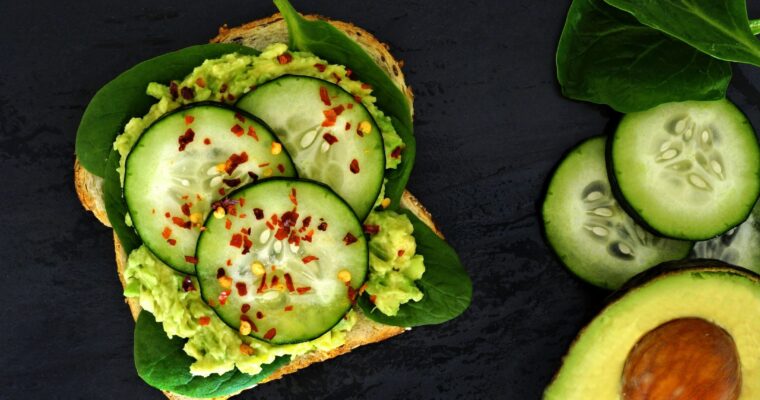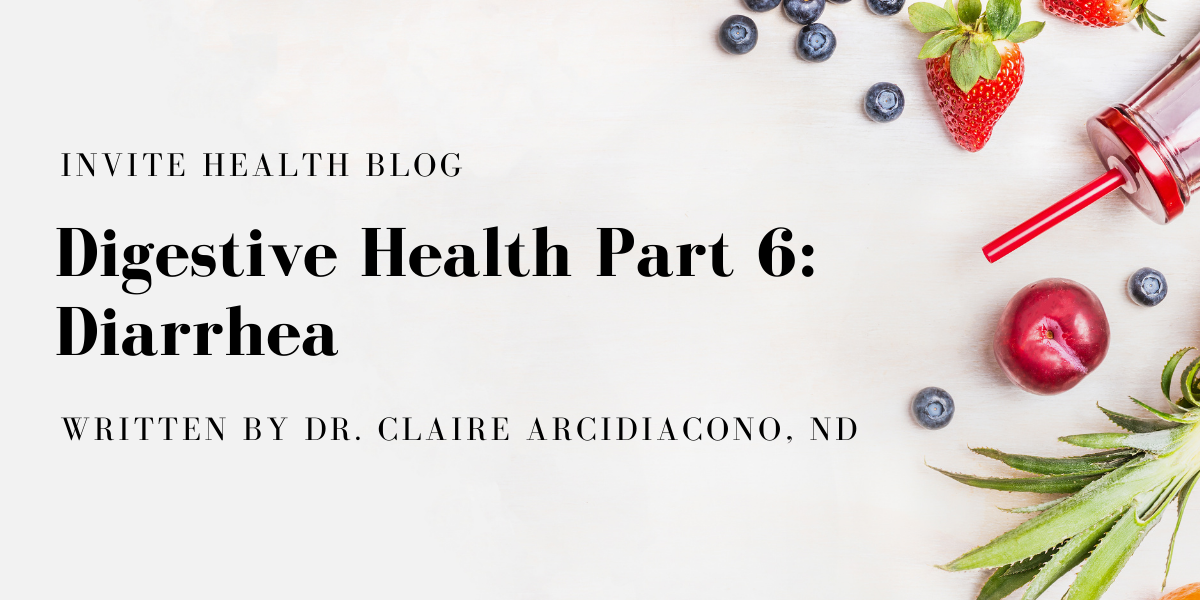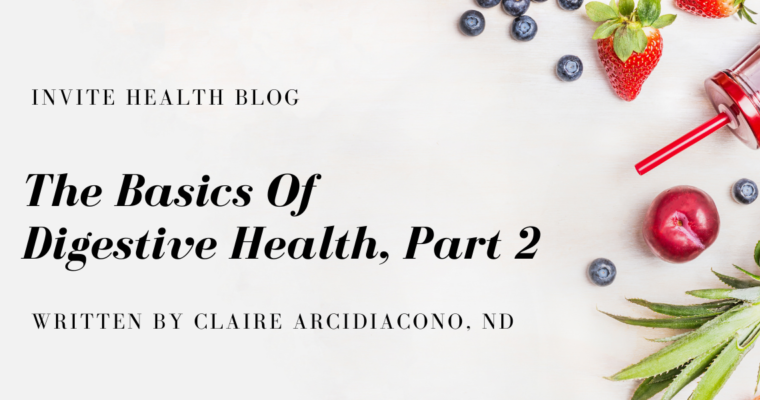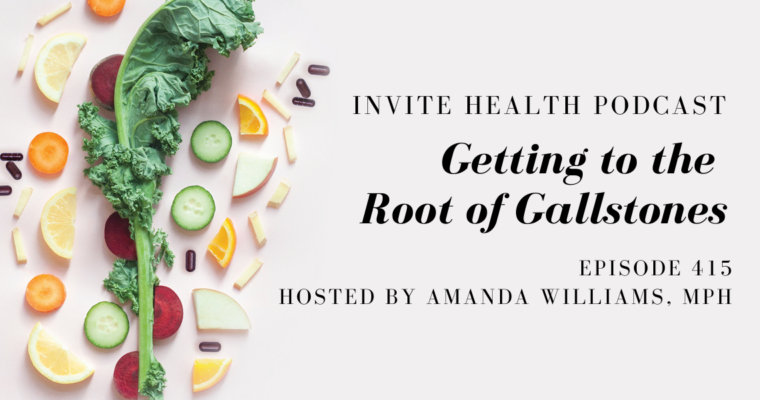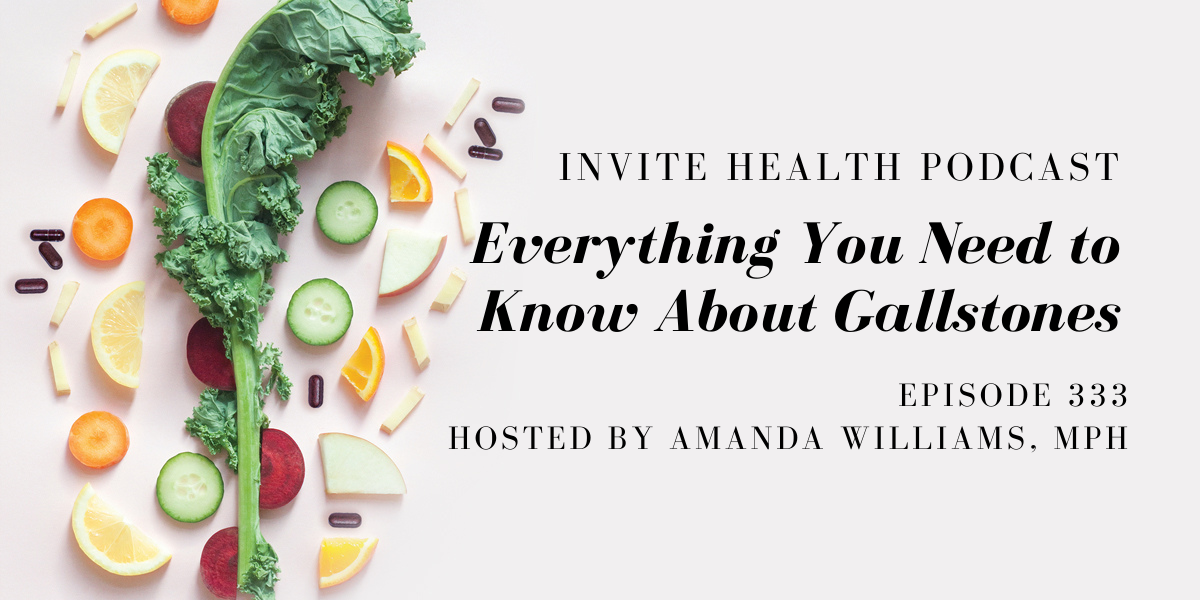Written by Dr. Claire Arcidiacono, ND Digestive
For further questions or concerns email me at carcidiacono@invitehealth.com†
Last week we talked about constipation, today we are discussing the exact opposite- diarrhea. Diarrhea is a frequent bowel movement caused by thin or loose watery stool. Severe diarrhea can be very dangerous especially in children and senior citizens. It is important to seek medical attention if diarrhea lasts more than 2 days, there is blood in the stool or a fever above 101.†
ICYMI: DIGESTIVE HEALTH, PART 5: CONSTIPATION >> READ NOW!
Causes and Symptoms
In addition to causing frequent thin/watery stool, diarrhea can cause stomach bloating stomach/intestinal cramps, nausea, vomiting or a feeling of urgency to have a bowel movement. Long term diarrhea can also cause what is called anal leakage as well as a decrease in sensitivity in both the tissues and in the natural “urge” to have a bowel movement. Chronic diarrhea can lead to a propensity to have trouble knowing when a bowel movement will occur and even controlling it. Both diarrhea and anal leakage can cause a painful irritation of the skin to occur. Chronic diarrhea, just like many chronic conditions, can be associated with anxiety and even depression as individuals start to feel anxious about their lack of control regarding bowel movements. They often feel isolated because the frequent bowel movements force them to stay home.† (1)
Chronic diarrhea can also be caused by pathogens just like constipation. Diarrhea that starts abruptly is often caused by bacteria i.e. food poisoning. Parasites from recent travel are another common cause. Usually known as the “24 hour bug” or stomach virus will often result in diarrhea.†
Certain medications can also cause diarrhea. Unfortunately many of the conventional treatments for constipation, such as laxatives, can lead to diarrhea. An example of medications that commonly lead to diarrhea are antibiotics. Treatments for different forms of cancer can also cause diarrhea. Food allergies or sensitivities like Celiac disease and lactose intolerance can also lead to diarrhea.†
Irritable bowel disease, functional bowel disorder, and Irritable bowel syndrome are certain intestinal diseases that can cause diarrhea. If an individual has a gallbladder dysfunction, had it removed, or has a “sluggish” gallbladder it can lead to diarrhea. If the gallbladder has been removed, it makes it very difficult to break down fat; part of why diarrhea can be experienced.† (2)
Several systemic issues can and do cause diarrhea such as diabetes type 1 and 2, Thyroid disorders and autoimmune disorders such as Systemic lupus erythematosus.† (3)
THYROID HEALTH IN RELATIONSHIP TO WOMEN’S HEALTH >> READ NOW!
Diarrhea and Digestive Health
Just like with constipation, in order to effectively work with diarrhea, it is important to know the underlying cause. If there is a systemic concern, it must be addressed first since working with the underlying concern will often result in the diarrhea or constipation naturally resolving itself. In many cases, diarrhea can be a result of a “24-hour bug” or virus which can resolve by itself quickly. If the diarrhea doesn’t clear up in a few days or is accompanied by a fever, going to a gastroenterologist can help you get down to the root cause.†
A stool test can help to rule in or rule out pathogens such as parasites, bacteria, fungus or even yeast. A breath test can help to rule out the pathogens that cause Small Intestinal Bacterial Overgrowth (SIBO). There are also tests to help rule out any food allergies or sensitivities.†
Once lab work is done and we know what is going on, the diarrhea is easier to treat. A food diary is always helpful. I always tell people to write down what they eat, how they felt, and if the diarrhea improved on certain days. It is very important to stay hydrated when you have diarrhea. Due to the loss of electrolytes, I suggest using Rice Water. (4) Following the BRAT DIET is helpful for your stomach after experiencing an episode of diarrhea: Bananas, rice, applesauce and toast (5) Eliminate food allergies or sensitivities from your diet. It is important to address any underlying systemic condition such as Hyperthyroidism.† (6)
Eliminate any pathogens with Probiotics that can help populate the digestive tract with good bacteria; eliminating any pathogens that cause diarrhea. (7) InviteⓇ’s Probiotic Hx, Probiotic Weight, Core Probiotic, and Probiotic Maintain are helpful supplements to build that good bacteria back up. Colostrum is one of the first things I will recommend when it comes to working with diarrhea. It helps to kill pathogens directly and boost the immune system. Colostrum also helps building up the mucus layer in the digestive system, what protects the digestive system from being damaged and leading to things such as leaky gut. (8) Our powered colostrum called Neuroimmune helps restore the damage in the digestive system.†
Antimicrobials have been found in studies to help eliminate pathogens that can cause both diarrhea and constipation. Caprylic acid has been found in studies to help eliminate H. Pylori, Candida and other types of pathogens. (9) Garlic has been found in studies to help eliminate bacteria and fungus such as Candida. (10) InViteⓇ’s Nutristatin 144 contains both Caprylic acid and Garlic to help eliminate bacteria and fungus. Our Aged Garlic can help eliminate bacteria and fungus as well. Olive Leaf Extract has been found to help eliminate microbes such as yeast in the body. (11). InViteⓇ’s Olive Leaf Extract as well as our Renalaid formula are helpful for eliminating microbes.†
Digestive enzymes are helpful when there is an issue with digesting, a person will often experience diarrhea. A good digestive enzyme will help eliminate this issue by breaking down the food. (12) InViteⓇ’s Digestive Hx and Prozyme Digest contain good digestive enzymes to help you with any digestive issues you may experience.†
If you are having any concerns regarding diarrhea, feel free to contact an InViteⓇ nutritionist for more information. Next week, we’ll delve into the differences of IBS vs IBD and how to work with these conditions.†
Sources
- https://www.webmd.com/digestive-disorders/digestive-diseases-diarrhea
- https://www.hopkinsmedicine.org/health/conditions-and-diseases/diarrhea
- https://www.ncbi.nlm.nih.gov/pmc/articles/PMC3150032/
- https://www.healthline.com/health/how-to-get-rid-of-diarrhea-fast#rice-water
- https://www.healthline.com/health/brat-diet
- https://www.healthline.com/health/foods-that-cause-diarrhea#food-and-diarrhea
- https://www.healthline.com/health/probiotics-and-digestive-health
- https://www.nature.com/articles/s41598-019-39644-x
- https://pubmed.ncbi.nlm.nih.gov/21830350/
- https://www.ncbi.nlm.nih.gov/pmc/articles/PMC4458355/
- https://www.ncbi.nlm.nih.gov/pmc/articles/PMC5490280/#:~:text=The%20present%20stud
- https://www.hopkinsmedicine.org/health/wellness-and-prevention/digestive-enzymes-and-digestive-enzyme-supplements


